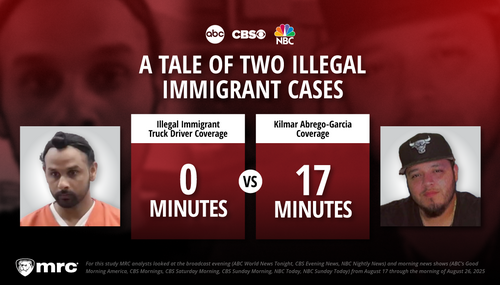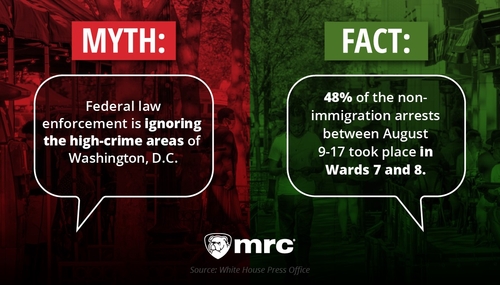As part of its endless cycle of being scandalized by Donald Trump, PBS NewsHour correspondent Laura Barron-Lopez interviewed liberal Harvard professor Laurence Tribe. She presented him as a "constitutional scholar" on Tuesday to explain how apparently wrong it was for a judge to rule Trump was eligible to be on the 2024 ballot in Colorado. Leftists sought to ban him from the ballot on 14th Amendment grounds for what the Constitution terms “shall have engaged in insurrection or rebellion” against the Constitution when he encouraged his backers to come to Washington and protest his 2020 re-election defeat on January 6.
PBS renewed its recent habit of using a single source to amplify a fringe liberal or anti-Trump argument.
Host Amna Nawaz set the table for the feast of electoral meddling, Democrat style.
Nawaz: A Civil War-era clause in the Constitution is at the center of a major legal question for 2024: Is former President Donald Trump qualified to be on the ballot?
From there, correspondent Laura Barron-Lopez pushed the Democratic talking points, skipping the shocking nature of the attempt to knock a former president off a major party’s ballot.
Laura Barron-Lopez: ….On Friday, a Colorado district judge ruled that Trump did engage in an insurrection by inciting the January 6 attack on the U.S. Capitol, but said the little-known clause doesn't apply to the presidency….The judge ruled that Trump engaged in an insurrection, a notable ruling, but that, for the purposes of the 14th Amendment, the president is not -- quote -- "an officer of the United States." To the average person, that might be pretty confusing, that every other public official, senator, congressmember, qualifies under this, but the president doesn't. Can you explain that?
Tribe agreed it was confusing and was all for removing Trump, the leading Republican candidate, off the Colorado ballot and presumably other state ballots as well, which sounds more than a bit like trying to overturn an election before it takes place.
Laurence Tribe, Professor, Harvard Law School: ….There was a great deal of evidence, on the basis of which she carefully found, by clear and convincing evidence, that Donald Trump, not only on January 6, but in the lead-up to January 6, having taken an oath to support the Constitution, turned against it and engaged in an insurrection against it. But, amazingly, she said, the language of the 14th Amendment, which was designed to protect the country and protect democracy from insurrectionists who had taken an oath to the Constitution, exempts the president. She said that that may sound preposterous. And it does, because it is. The language clearly covers the presidency as an office under the Constitution….
Barron-Lopez asked Tribe a leading question and got the overheated answer she no doubt wanted.
Barron-Lopez: If these challenges to former President Trump's qualification fail, and if Trump is granted absolute immunity from criminal prosecution for conspiring to overturn the 2020 election, which is something that he's arguing in the federal January 6 case, what does that mean for the presidency and accountability?
Tribe: Well, if that were to happen -- and I very much hope it doesn't -- it would turn the presidency into a dictatorship. It would basically mean that the revolution that we fought against King George failed, and that the American experiment in constitutional democracy, with no one being above the law, lasted 225 years, and then ended. I don't want that to happen. I think it would be a disaster for the freedom of every one of us to have anybody completely above the law. We have in this case someone who said he would terminate the Constitution. He will make his presidency about vengeance. It's what fascists do….
Expect to hear that particular F-word (fascism) more and more as the election draws closer. But wouldn’t actual fascism involve something like, say, removing one’s political opponents from the ballot?
This push to get Donald Trump removed from the ballot was brought to you in part by BDO.
A transcript is available, click “Expand.”
PBS NewsHour
11/21/23
7:29:09 pm (ET)
Amna Nawaz: A Civil War-era clause in the Constitution is at the center of a major legal question for 2024: Is former President Donald Trump qualified to be on the ballot?
White House correspondent Laura Barron-Lopez takes a deeper look at the lawsuits over the 14th Amendment.
Laura Barron-Lopez: The legal war continues over whether former President Trump should be disqualified from the ballot in Colorado.
The case is over Section 3 of the 14th Amendment, which bars a person from future office if they have taken an oath to the Constitution and later engage in an insurrection or aid the Constitution's enemies. On Friday, a Colorado district judge ruled that Trump did engage in an insurrection by inciting the January 6 attack on the U.S. Capitol, but said the little-known clause doesn't apply to the presidency.
Now both Trump and the plaintiffs in the case, backed by the nonprofit Citizens for Responsibility and Ethics in Washington, have filed appeals.
Joining me now to discuss is Laurence Tribe. He's a constitutional scholar at Harvard Law School and first backed the 14th Amendment theory earlier this year.
Professor Tribe, thank you so much for joining the "NewsHour."
The judge ruled that Trump engaged in an insurrection, a notable ruling, but that, for the purposes of the 14th Amendment, the president is not — quote — "an officer of the United States."
To the average person, that might be pretty confusing, that every other public official, senator, congressmember, qualifies under this, but the president doesn't. Can you explain that?
Laurence Tribe, Professor, Harvard Law School: Well, it's quite confusing, and, in fact, it was confusing to the trial court judge herself.
She conducted a very elaborate weeklong trial. There was a great deal of evidence, on the basis of which she carefully found, by clear and convincing evidence, that Donald Trump, not only on January 6, but in the lead-up to January 6, having taken an oath to support the Constitution, turned against it and engaged in an insurrection against it.
But, amazingly, she said, the language of the 14th Amendment, which was designed to protect the country and protect democracy from insurrectionists who had taken an oath to the Constitution, exempts the president. She said that that may sound preposterous.
And it does, because it is. The language clearly covers the presidency as an office under the Constitution. It's described that way throughout the Constitution. Donald Trump himself described it that way in his filings in other cases. And, in fact, exempting the presidency would turn the Constitution upside down.
It would mean, among other things, that Jefferson Davis, having led the Confederacy, could then have turned around after the Civil War and been president again. That's not the way the Constitution was designed or written.
Laura Barron-Lopez: There's a few other things I want to get to, but this is being appealed to the Colorado Supreme Court now. So what do you expect to happen next?
Laurence Tribe: Right. Well, I think the Colorado Supreme Court, which is on a very expedited schedule, is quite likely to reverse the bizarre holding that exempts the president, a holding that would, among other things, mean that presidents could accept emoluments from foreign countries, that you could have a religious test for the presidency.
Having done that, the question is, will they find some basis to overturn the really important holding of the trial court, that this was an insurrection against the Constitution and that Donald Trump engaged in it?
If they don't overturn that holding, they will order that Trump not be on the ballot. And he will then seek review in the U.S. Supreme Court, which will undoubtedly agree to hear the case on an expedited basis, because the primary election is going to occur really quite soon, in early 2024 in Colorado.
Laura Barron-Lopez: Professor, Michael Mukasey, the former attorney general under George W. Bush, argued in an op-ed recently that Trump is not an — quote — "officer of the United States," which is some of the language that they use in the 14th Amendment. And he cited a 2010 ruling by the Supreme Court where Chief Justice John Roberts said that the people do not vote for officers of the United States.
So what's your response to that argument?
Laurence Tribe: It's completely wrong.
Judge Luttig, Michael Luttig, a very distinguished former federal judge, a conservative, and I have examined that argument and find it, frankly, empty. It just doesn't make sense. Of course, the people don't vote for other officers. That's why the Constitution specifies that the senators and members of the House are subject to this.
And then it says, so are officers of the United States, those who are not elected. It's true that presidents aren't elected. Neither are Cabinet members. Yet no one doubts that they are subject to this restriction. It just doesn't make the slightest sense. And with all due respect to former Attorney General Mukasey, he wouldn't get a high grade on turning that answer in.
Laura Barron-Lopez: If these challenges to former President Trump's qualification fail, and if Trump is granted absolute immunity from criminal prosecution for conspiring to overturn the 2020 election, which is something that he's arguing in the federal January 6 case, what does that mean for the presidency and accountability?
Laurence Tribe: Well, if that were to happen — and I very much hope it doesn't — it would turn the presidency into a dictatorship.
It would basically mean that the revolution that we fought against King George failed, and that the American experiment in constitutional democracy, with no one being above the law, lasted 225 years, and then ended. I don't want that to happen. I think it would be a disaster for the freedom of every one of us to have anybody completely above the law.
We have in this case someone who said he would terminate the Constitution. He will make his presidency about vengeance. It's what fascists do. It's what is happening in many parts of the world, in Russia, quite recently. It looks like Argentina is moving in that direction, in Hungary.
We really should not join those that have turned their backs on freedom and liberty. That's what would happen if absolute immunity were granted to the president and if he were allowed to take power again.
Laura Barron-Lopez: Professor Laurence Tribe of Harvard Law School, thank you so much for your time.
Laurence Tribe: Thank you so much.




